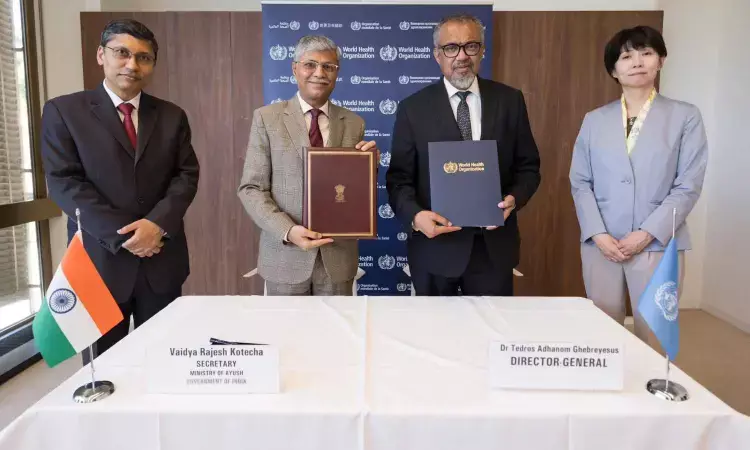- Home
- Medical news & Guidelines
- Anesthesiology
- Cardiology and CTVS
- Critical Care
- Dentistry
- Dermatology
- Diabetes and Endocrinology
- ENT
- Gastroenterology
- Medicine
- Nephrology
- Neurology
- Obstretics-Gynaecology
- Oncology
- Ophthalmology
- Orthopaedics
- Pediatrics-Neonatology
- Psychiatry
- Pulmonology
- Radiology
- Surgery
- Urology
- Laboratory Medicine
- Diet
- Nursing
- Paramedical
- Physiotherapy
- Health news
- Fact Check
- Bone Health Fact Check
- Brain Health Fact Check
- Cancer Related Fact Check
- Child Care Fact Check
- Dental and oral health fact check
- Diabetes and metabolic health fact check
- Diet and Nutrition Fact Check
- Eye and ENT Care Fact Check
- Fitness fact check
- Gut health fact check
- Heart health fact check
- Kidney health fact check
- Medical education fact check
- Men's health fact check
- Respiratory fact check
- Skin and hair care fact check
- Vaccine and Immunization fact check
- Women's health fact check
- AYUSH
- State News
- Andaman and Nicobar Islands
- Andhra Pradesh
- Arunachal Pradesh
- Assam
- Bihar
- Chandigarh
- Chattisgarh
- Dadra and Nagar Haveli
- Daman and Diu
- Delhi
- Goa
- Gujarat
- Haryana
- Himachal Pradesh
- Jammu & Kashmir
- Jharkhand
- Karnataka
- Kerala
- Ladakh
- Lakshadweep
- Madhya Pradesh
- Maharashtra
- Manipur
- Meghalaya
- Mizoram
- Nagaland
- Odisha
- Puducherry
- Punjab
- Rajasthan
- Sikkim
- Tamil Nadu
- Telangana
- Tripura
- Uttar Pradesh
- Uttrakhand
- West Bengal
- Medical Education
- Industry
AYUSH goes Global: India Partners with WHO on Traditional Medicine Initiatives

New Delhi: In a landmark development poised to transform the global standing of traditional medicine systems, an agreement was signed between the Ministry of Ayush and the World Health Organization (WHO) on May 24, 2025.
The agreement marks the beginning of work on a dedicated Traditional Medicine module under the International Classification of Health Interventions (ICHI).
Highlighting the significance of this achievement during the 122nd episode of Mann Ki Baat, Prime Minister Shri Narendra Modi said, "Friends, something has happened in the field of Ayurveda as well, which you will be very happy to know about. Just yesterday, i.e. on 24th May, an MoU was signed in the presence of WHO Director General and my friend Tulsi Bhai.
Also Read:WHO declares India Trachoma-free at World Health Assembly
Along with this agreement, work has started on a dedicated traditional medicine module under the International Classification of Health Interventions. This initiative will help in making Ayush reach maximum number of people across the world in a scientific manner."
The ICHI, complementing WHO’s International Classification of Diseases (ICD-11), documents what treatments and health interventions are administered. With the inclusion of a traditional medicine module, therapies from Ayurveda, Yoga, Siddha, and Unani systems—such as Panchakarma, Yoga therapy, Unani regimens, and Siddha procedures—will now be recognized in globally standardized terms.
This will bring about multiple benefits:
● Transparent billing and fair pricing for Ayush services.
● Smoother integration of Ayush treatments in health insurance coverage.
● Enhanced hospital management, clinical documentation, and health research.
● Most importantly, greater global accessibility to Ayush interventions.
This development aligns with India’s vision of bringing its rich heritage of traditional wisdom into the global healthcare mainstream, backed by scientific classification and international standards.
Welcoming the agreement, WHO Director-General Dr Tedros Adhanom Ghebreyesus stated on X (formerly Twitter):
"Pleased to sign an agreement for a $3 million contribution from #India to @WHO’s work on traditional medicine and the International Classification of Health Interventions, with @moAyush Secretary Vaidya Rajesh Kotecha. We welcome 🇮🇳’s continued commitment to #HealthForAll."
The combined impact of ICD-11 for diseases and the new ICHI module for interventions will ensure that Ayush becomes an integral, evidence-based, and policy-recognized part of global healthcare systems.
This is more than a coding update—it is a transformative step toward affordable, accessible, and trusted healthcare through India's traditional systems.
Also Read:WHO's 2025 ICD-11 update includes traditional medicine in health module
Kajal Rajput joined Medical Dialogues as an Correspondent for the Latest Health News Section in 2019. She holds a Bachelor's degree in Arts from University of Delhi. She manly covers all the updates in health news, hospitals, doctors news, government policies and Health Ministry. She can be contacted at editorial@medicaldialogues.in Contact no. 011-43720751


